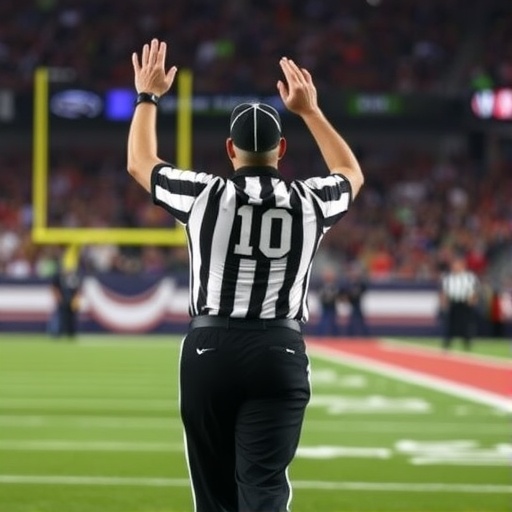A groundbreaking study from The University of Texas at El Paso (UTEP) reveals a subtle but significant phenomenon at the intersection of economics and sports governance: financial incentives appear to influence officiating decisions within the National Football League (NFL). Led by Spencer Barnes, Ph.D., an assistant professor of finance at UTEP’s Woody L. Hunt College of Business, the research rigorously analyzes over 13,000 penalty calls spanning nearly a decade—from 2015 to 2023—uncovering a disproportionate favoring of the Kansas City Chiefs during postseason play. This trend intriguingly aligns with the rise of the Chiefs under quarterback Patrick Mahomes, reinforcing their status as a marquee franchise in the league.
At its core, the study illuminates how economic pressures can subtly shape the enforcement of rules in one of America’s most culturally significant and financially lucrative industries. The NFL’s unique structure, featuring referees whose decisions are made in real-time and broadcast live, offers a rare empirical window into regulatory dynamics. Unlike abstract or opaque regulatory systems, NFL officiating decisions are transparent, magnifying the implications of any bias. The research employs robust statistical methods to control for confounding factors, allowing for a focused investigation into whether the league’s dependency on financially dominant teams affects impartiality.
Crucially, the research rejects simplistic notions of overt corruption or deliberate bias. Instead, it suggests a phenomenon akin to regulatory capture — a concept widely explored in economic and governance literature—where the priorities of powerful market participants influence rule enforcement indirectly. In this context, league officials, consciously or unconsciously, may adjust penalty calls in ways that protect and enhance the market appeal of leading franchises, thus safeguarding league revenues and viewer engagement.
One of the most striking findings is that playoff penalties called against defensive teams playing the Chiefs’ offense were significantly more likely to result in advantageous outcomes for Kansas City. These penalties tended to grant additional first downs, cover more yardage, and often fell into categories driven by subjective interpretation, such as roughing the passer or pass interference. This level of granular analysis underscores the study’s depth, highlighting not only the frequency but also the quality and impact of these calls.
Interestingly, the study finds this phenomenon to be uniquely pronounced with the Chiefs and absent in other similar dynasties such as the Tom Brady–led New England Patriots or other recent Super Bowl contenders. This specificity suggests that the observed pattern is closely tied to Kansas City’s unique emergence as a television ratings powerhouse. The research team links this to an important context: declining NFL viewership and ratings during the politically turbulent 2015–2017 seasons, immediately preceding the Mahomes era. Thereby, officiating adjustments may reflect a strategic response to preserve the league’s commercial appeal during crucial revenue-generating playoff periods.
From a broader perspective, the implications extend well beyond the gridiron. The study’s insights resonate deeply with longstanding concerns in economic policy, corporate governance, and regulatory frameworks where major market players may gain advantages not through overt malfeasance but via the adaptive behavior of institutions under pressure. This nuanced distortion of impartiality bears relevance for understanding fairness in arenas where high stakes and financial dependencies intersect.
Spencer Barnes highlights that the findings challenge assumptions of neutrality in rule enforcement, emphasizing that economic realities can subtly pivot ostensibly objective decisions. The study not only reframes conversations around sportsmanship and competition in professional football but also delivers a cautionary tale on the fragility of fairness in institutions where financial health is paramount.
John Hadjimarcou, Ph.D., dean of UTEP’s Woody L. Hunt College of Business, underscores the societal significance of the research, noting how it unearths hidden power dynamics shaping trust and equity in public decision-making. The study exemplifies how rigorous academic inquiry can reveal underappreciated mechanisms that threaten competitive balance and public confidence in institutions ranging from sports leagues to financial markets.
Technically, the research integrates advanced statistical modeling and econometric analysis, isolating the effects of subjective penalty calls across multiple seasons. It meticulously differentiates between penalty types and context to determine the precise nature of biases, ensuring findings are not confounded by random variance or team performance. This methodological sophistication positions the study at the forefront of empirical research on regulatory behavior and economic decision-making.
In summation, the UTEP study sheds vital light on a critical socio-economic phenomenon: the intersection of financial incentives and regulatory integrity in high-stakes environments. It advances a deeper understanding of how commercial pressures may imperceptibly reshape the governance of professional sports and analogous sectors, ultimately challenging the foundational ideals of fairness, competition, and trust.
The University of Texas at El Paso continues to demonstrate its commitment to advancing Hispanic-serving research initiatives that address complex societal issues, blending rigorous academic analysis with real-world relevance. This study, published in the Financial Review, marks a seminal contribution not only to sports economics but also to interdisciplinary investigations of economic decision making.
Subject of Research: Influence of financial incentives on NFL officiating decisions and regulatory capture in sports governance.
Article Title: Under (Financial) Pressure
News Publication Date: October 8, 2025
Web References: https://onlinelibrary.wiley.com/doi/10.1111/fire.70020
References: Published in Financial Review, DOI: 10.1111/fire.70020
Image Credits: The University of Texas at El Paso
Keywords: Statistics, Applied mathematics, Statistical analysis, Economics, Mathematical economics, Economic decision making, Business




